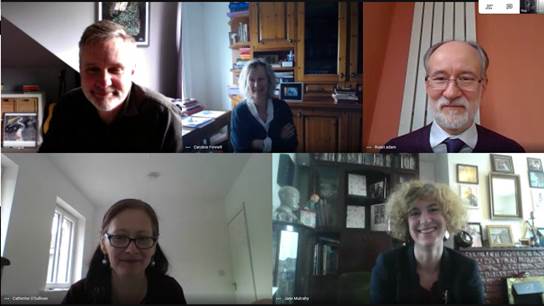In This Section
- Home
- About us
- People
- Courses
- Current Students
- Research
- Shaping Society
- Careers
- News and Events
- Alumni
- International Applicants
- College of Business and Law
- Scholarships and Prizes
- European China Law Studies Association Annual Conference 2025
First Virtual Viva Voce in UCC School of Law History

PhD candidate Jane Mulcahy successfully defends her doctoral thesis via Microsoft Teams
In an historic first for the UCC School of Law, PhD student Jane Mulcahy has defended her thesis in a viva held virtually using Microsoft Teams.
Jane’s Viva was originally intended to be held in person, but due to the on-going COVID-19 crisis, the university remains closed and staff and students have been working from home since March. The decision was thus made to move the proceedings online.
Jane’s thesis is entitled "Connected Corrections and Corrected Connections: post-release supervision of long sentence male prisoners." Jane was funded by the Irish Research Council under the employment-based PhD scheme and co-funded by the Probation Service. The Cork Alliance Centre, a desistance project in Cork city, was Jane's employment partner for the four-year funding period.
Present (from their respective homes!) at Jane’s Viva Voce were Internal Examiner Professor Caroline Fennell. The External Examiner was Professor Fergus McNeill of the University of Glasgow. Professor Frederic Adam of Cork University Business School served as Independent Internal Chair. Jane’s PhD supervisors were Dr Fiona Donson and Dr Catherine O’Sullivan from the UCC School of Law.
In her thesis, Jane establishes the desirability of adopting a connected, healing-centred approach in which multiagency collaboration is prioritised in order to improve outcomes for long sentence male prisoners. She explores how childhood trauma is often at the root of addiction and offending behaviour, based on qualitative interview data with twelve men approaching release. Their narratives revealed histories of neglect, abuse, family dysfunction, poverty, deprivation and community adversity.
Jane goes on to argue that penal policy and practice must become trauma-responsive as a matter of urgency. Physiological safety is a prerequisite for human beings, without which we cannot develop new, healthier relational patterns or adopt pro-social behaviours. To increase the desistance-supportive potential of prison and post-release supervision in Ireland, people working on the frontlines of criminal justice must play a personal role in helping offenders to begin to renegotiate and re-story their undigested trauma, by fostering relational health, promoting strengths and displaying cultural sensitivity. Greater effort is required to ensure that the transition back to the community is safe and responsibly managed. A whole of government response is necessary to ensure that basic human needs are met upon release.
Commenting on her experience of a Virtual Viva, Jane Mulcahy said:
"While I was disappointed that the pandemic and resulting lockdown meant that I would be unable to defend my thesis with my two examiners in person, and was rather nervous about the quality of the internet connection, in fact the experience was much better than anticipated. I was so absorbed in the questions, focused on providing as succinct and robust responses as I possibly could, that I did not dwell on the fact that I was speaking to a screen with five small faces. The presence of an independent chair was also a comforting precaution. All in all, I was very happy with how I acquitted myself and am not sure I would have performed any better if we were all in the same room together."
A huge congratulations to Jane – soon to be Dr Mulcahy! – from all at the UCC School of Law.
School of Law
Scoil an Dlí
Contact us
Room 1.63, Aras na Laoi, T12 T656
